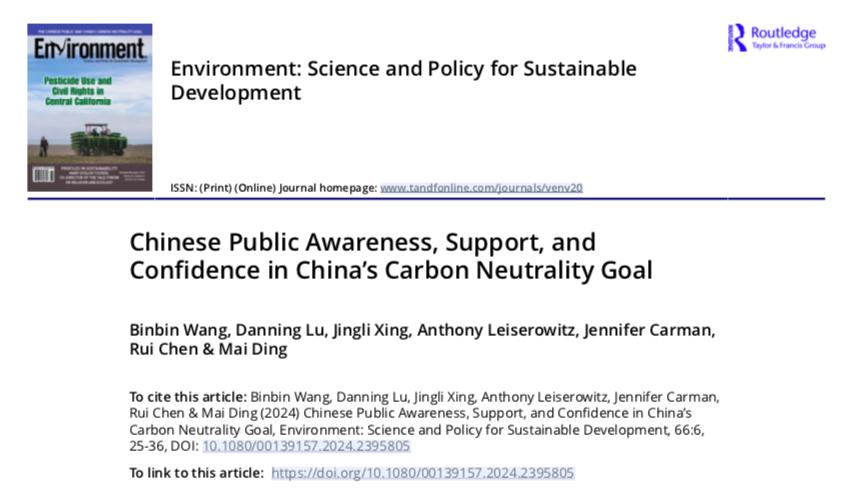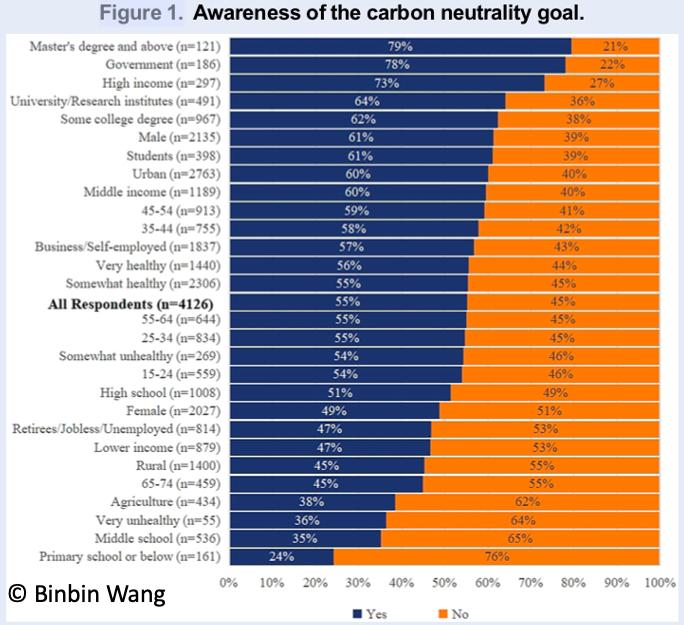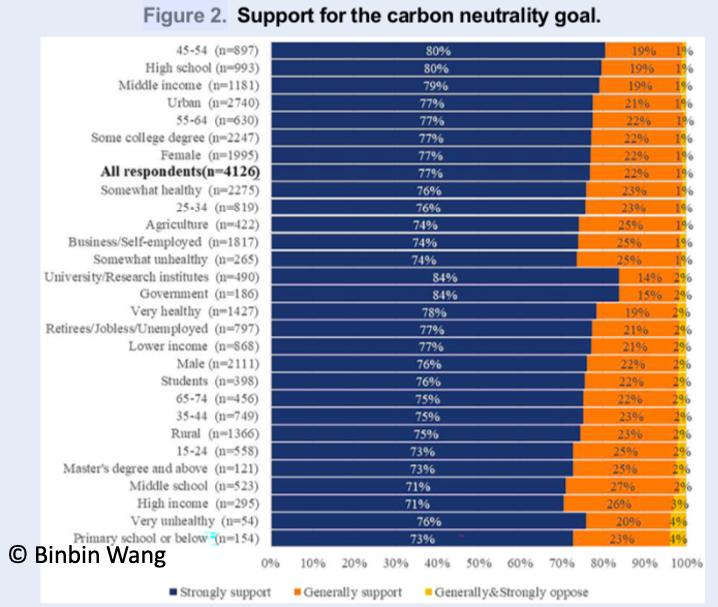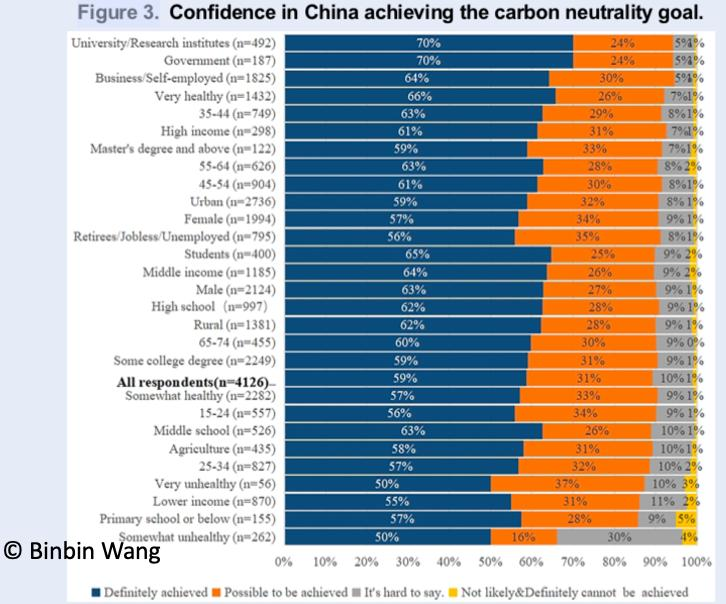Peking University, January 3, 2025: Recently, the UNFCCC COP29 concluded in Baku, the capital of Azerbaijan, where multiple successes were achieved, injecting new momentum into global climate action. To close the gap of Chinese people’s awareness of carbon neutrality, Dr. Wang Binbin, Associate Research Professor and Founding Director of Climate Future Global Innovation Lab (C Force) at Peking University's Institute for Carbon Neutrality published a research in the SSCI journal Environment: Science and Policy for Sustainable Development, titled "Chinese Public Awareness, Support, and Confidence in China’s Carbon Neutrality Goal." The work was coauthored by Dr. Anthony Leiserowitz, Director of the Yale Program on Climate Change Communication (YPCCC), as well as other researchers.
Why it matters:
Given that Trump might withdraw from the Paris Agreement again, more expectations were put into China’s commitments to carbon neutrality. Unlike the U.S. or the EU, whose pathways to carbon nuetrality are 43 years and over 70 years ahead respectively, China is projected to attain the goal in 30 years. Comprehensive societal efforts, along with broad, systemic changes, are required to achieve carbon neutrality. It is a necessity that effective social mobilization be grounded in scientific research, yet there has been a lack of global studies on the public awareness of carbon neutrality among Chinese people.
"Achieving the goal of carbon neutrality in record time proves to be a challenging tasks, and China encounters considerable difficulties,” Dr. Wang Binbin commented, “However, the good news is that the Chinese government has established the '1+N' policy and action framework, releasing guidelines on accelerating green transitions across sectors. The attainment of carbon neutrality requires everyone to work hand in hand. Our study focuses on understanding the level of public awareness, support, and confidence in the goal, and thus inform stakeholders and policymakers about how to advance it."
Key Findings:
The study shows that over half of the respondents have heard of China’s carbon neutrality goal, 99% were in support of the goal, and 90% were confident of China’s achieving it.
Awareness: According to statistics, respondents in government, academia, and research institutions had above-average level of awareness of the carbon neutrality goal, while retirees, unemployed individuals, and those engaged in agriculture showed lower awareness. Awareness levels correlated positively with education and income; high-income and urban respondents, as well as middle-aged men, showed the highest awareness level.
Fig.1 Awareness of Carbon Neutrality Goal
Support: Although groups like high school students, women, and agricultural workers showed lower awareness, their support for carbon neutrality was at or above average. Support levels were particularly high among high school students, undergraduates, middle-income employees, urban residents, and government/academic professionals.
Fig.2 Support for the Carbon Neutrality Goal
Confidence: The confidence in achieving carbon neutrality was higher among respondents working for government and in the fields of academia and businesses, students, high-income employees, and urban residents. Healthier individuals also presented more confidence than those in poorer health state.
Fig.3 Confidence in China Achieving the Carbon Neutrality Goal
Significance:
Suggestions on Policy-making and Communication
Targeted Mobilization: Middle-aged, urban residents working for government or in academic field, especially those bachelor’s degree holders, show higher levels of awareness, support, and confidence. They could be prioritized for mobilization projects.
Engagement of Women: Although women show lower awareness, their support is comparable to men’s. Efforts to raise their awareness could make them strong advocates for carbon neutrality.
Youth Outreach: Contrary to many studies, younger respondents (15-24) showed lower levels of awareness and confidence. However, they are critical for the future of carbon neutrality and could benefit from tailored education on this topic.
Support for Middle-Income Earners: Middle-income respondents demonstrated high levels of support and confidence. Providing them with support and empowerment could increase their engagement in carbon-neutral actions.
Outreach to Agricultural Workers: Awareness, support, and confidence levels are lower among agricultural workers. While agriculture takes up a significant proportion of the total emission, targeted communication could encourage them to adopt emission reducution practices.
Communication with groups in poorer health state: As climate change produces increasing impacts on health, raising awareness among less healthy populations could enhance their engagement in climate actions.
About the Research Team:
Sino-US Joint Research Team
The study was led by Dr. Binbin Wang of Peking University, co-first authored by Danning Lu, YPCCC research affiliate, development studies PhD student at Cornell University. The research team included Dr. Anthony Leiserowitz, Director of YPCCC at Yale University, along with experts from China Communication University, CSM Media Research, and the Chinese Academy of Medical Sciences. This interdisciplinary team contributed insights from various perspectives.
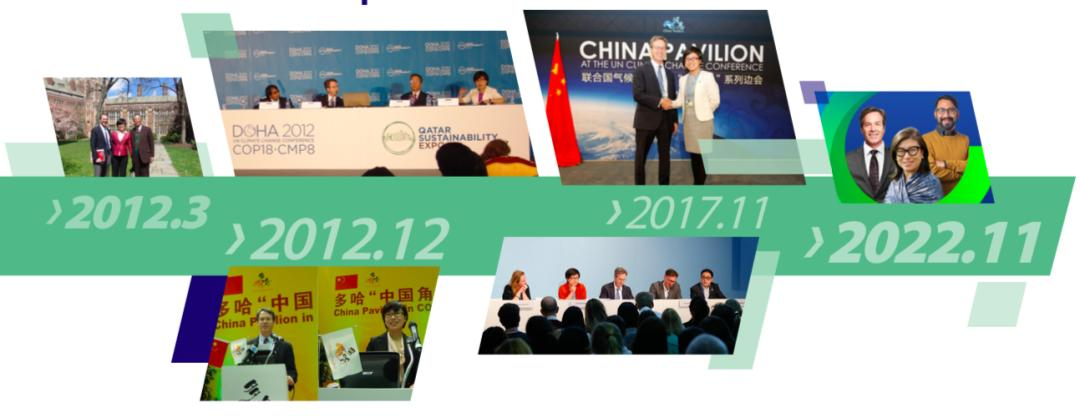
Dr. Binbin Wang and Dr. Anthony Leiserowitz have worked in collaboration for over ten years, their joint research findings included twice in China’s official white papers on climate change. Their work has been presented at the United Nations Climate Change Conferences in Doha (2012) and Bonn (2017). Key data from their research was cited by Christiana Figueres, former Executive Secretary of the United Nations Framework Convention on Climate Change (UNFCCC), and included in official UN documents. Their 2017 joint research made a significant contribution to strengthening Sino-US climate cooperation.
Reference:
Binbin Wang, Danning Lu, Jingli Xing, Anthony Leiserowitz, Jennifer Carman, Rui Chen & Mai Ding (2024) Chinese Public Awareness, Support, and Confidence in China’s Carbon Neutrality Goal, Environment: Science and Policy for Sustainable Development, 66:6, 25-36, DOI: 10.1080/00139157.2024.2395805
*This article is featured in PKU News' "Why It Matters" series. More from this series.
Edited by: He Yike
Source: Institute of Carbon Neutrality, Peking University
